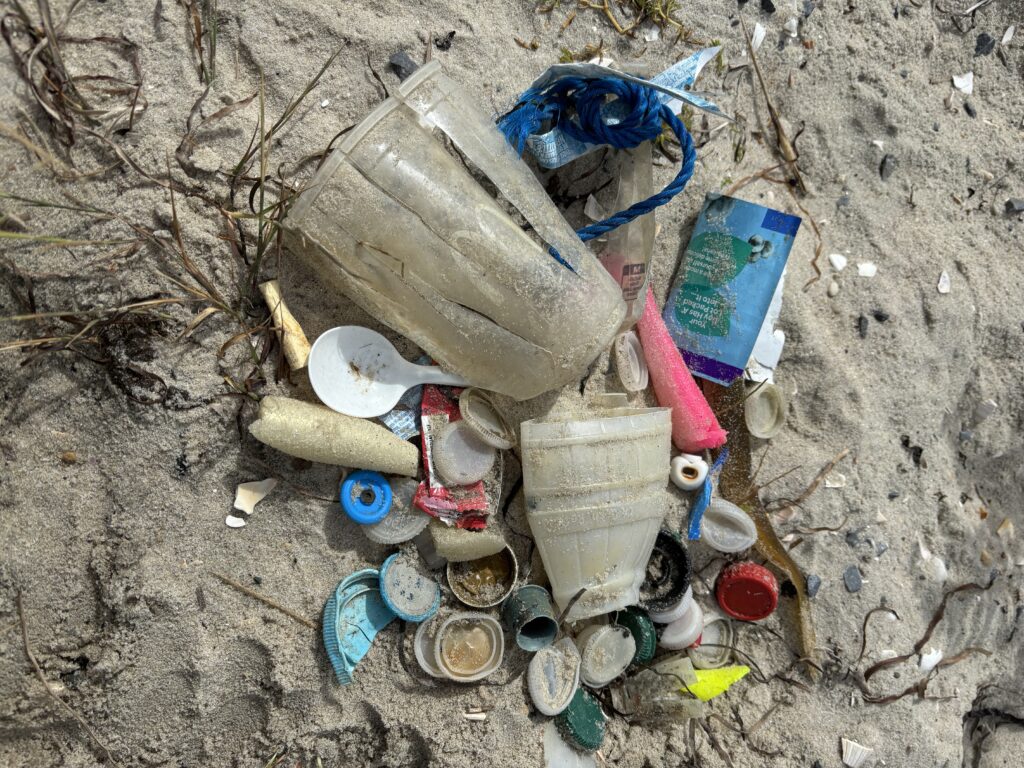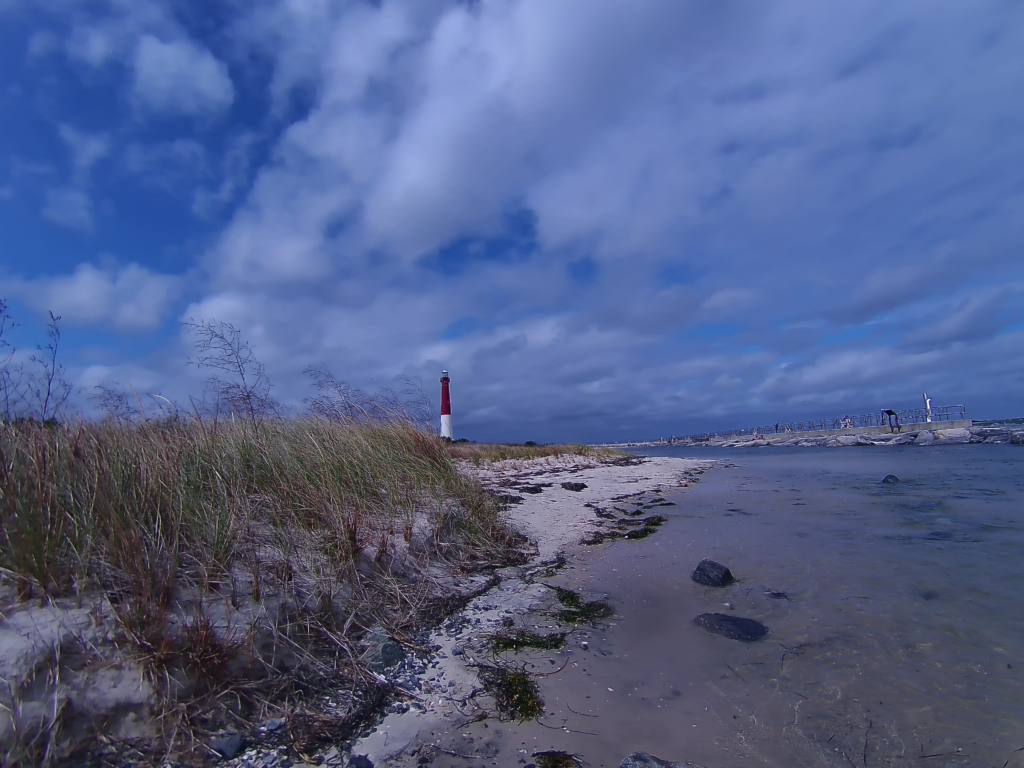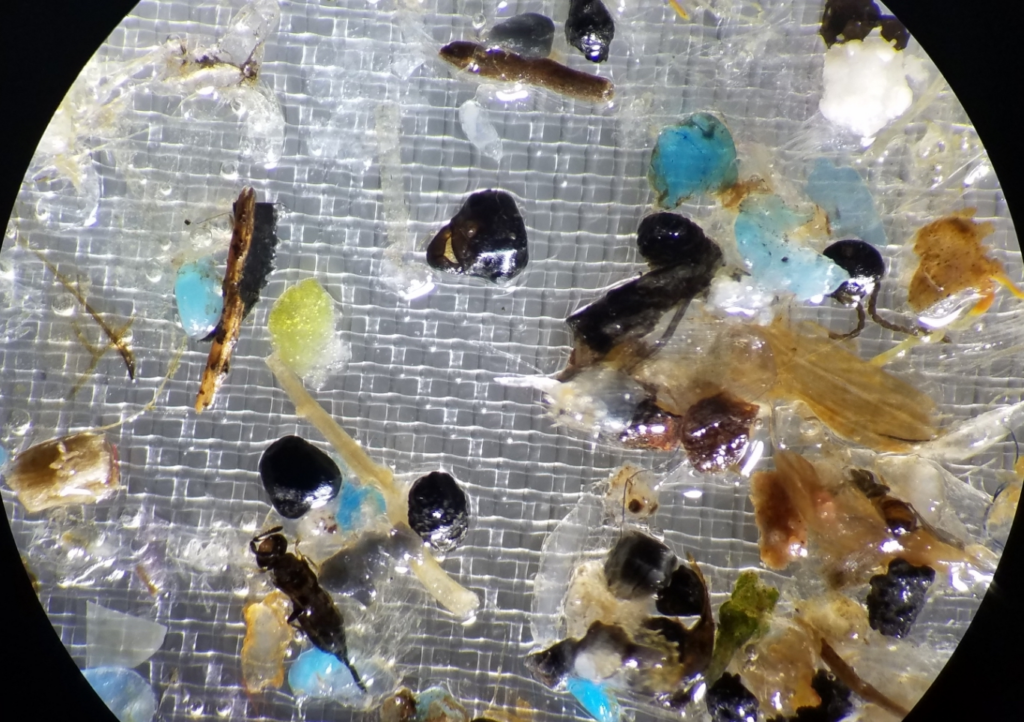Main Content
Marine debris in our coastal waters is a significant environmental issue. Many groups have been taking action to prevent items from finding their way into marine environments and to remove debris that has already entered marine ecosystems. This webpage is intended to educate the public on marine debris issues and offer solutions on how to reduce and properly dispose of waste so that it doesn’t later become marine debris.
Marine debris is defined as any consistent processed solid material that is disposed into any marine environment (NOAA, 2024). Marine debris enters waterways, streams, and rivers that lead to coastal estuaries and then ultimately into the ocean. This debris can include materials such as lost fishing gear, abandoned vessels, boat flares, and plastic bags and bottles. There are many ways by which marine debris can become pollution, including littered items on streets, trash blown from dumpsters, abandonment, or improper waste disposal. Upon entering brackish or saltwater ecosystems, materials become weathered down by environmental conditions. Ultraviolet radiation from sunlight and wave action can fragment plastic materials into smaller pieces until they are eventual micro plastic particles (Tibbetts, 2014).
The best way to prevent marine debris from entering the ocean in the first place is through proper waste management. Locally, Ocean County offers many waste collection opportunities that serve as alternatives to waste entering a landfill or the ocean.
Opportunities in Ocean County
- Monofilament recycling locations – PDF
- Recycle Coach – Ocean County Dept. of Solid Waste Mgmt.
- Boat Shrink Wrap Recycling – State of New Jersey (PDF)
- Junk Boat Removal – Ocean County Dumpsters and Junk
- Ocean County Flare Recycling – Ocean County Dept. of Solid Waste Mgmt.
- Ocean County Dept. of Solid Waste Management
- Ocean County Recycling Guide – Manchester Township (PDF)
- Ocean County Recycling Guide for Vacationers – Ocean County Dept. of Solid Waste Mgmt.
- Ocean County Recycling Guide for Boat Owners – Ocean County Dept. of Solid Waste Mgmt.


Local Seasonal Beach Clean-ups and Citizen Science Programs
Paying attention to recycling codes, special waste separation days and drop off options will make the difference of whether the item can be repurposed or not. Also being aware of collection sites at docks and marinas for fishing line, old nets, and trap materials will prevent these excess materials from being lost at sea. Participating in seasonal beach clean ups is an important effort, as well as being mindful of other methods of citizen science and outreach projects.
- Citizen Science – Microplastics Monitoring Community Science – Plastic Wave Project
- Beach Sweeps – Clean Ocean Action
- Volunteer – Littoral Society (littoralsociety.org)
- Marine Debris Monitoring and Assessment Project | Marine Debris Program (noaa.gov)
- Volunteer Opportunities — Save Coastal Wildlife
- Barnegat Bay Blitz – Barnegat Bay Partnership
Opportunities in New Jersey for the Public to Properly Dispose of and/or Recycle Items to Help Prevent Marine Debris
Looking to your county and other local state partners for opportunities to recycle is a great way to see what others are doing to make a difference. Efforts include collection of abandoned or broken fish and crustacean traps, abandoned vessel decommissioning and removal, and strategies to target balloon, tire, and cigarette litter.
To fill this gap, we have provided waste collection opportunities within the county and state to educate citizens about options other than solid waste for disposal. The inclusion of these resources will help those interested in better waste management and instill end user responsibility that is often not considered by the producer of common products. Due to the scale of the issue, there are other state initiatives to check out as well:
| Program | Coordinating Group |
|---|---|
| New Jersey Clean Marina Program | NJDEP |
| Recycling/Disposal of Boats and Jet Skis | Ocean County Dept. of Solid Waste Mgmt. |
| Monofilament Recycling | Sandy Hook Foundation |
| Remove My Boat | Private |
| Monofilament Fishing Line Recycling | Boat US Foundation |
| Fishing and Crabbing Gear Disposal | Ocean County |
| Recycling Fishing Line | Take Me Fishing |
| Derelict Crab Pot Removal | Conserve Wildlife Foundation |
| Boat/Watercraft Donation Program | Veteran Car Donations |
| Abandoned Vessel Program | NJ Motor Vehicle Commission |
| County Recycling Programs | NJ Department of Environmental Protection |
| Marine Debris Impacts | NOAA |
| New Jersey Marine Debris | NOAA |
| Marine Debris Program | NOAA |
| ADV Boat Database | Boat US Foundation |
| Clean Shores Program | NJDEP |
| Marine Debris Campaign | Clean Ocean Action |
Recommended Practices for Reducing Plastics Pollution in the Ocean
- Prevent plastic from having the ability to enter the ocean in the first place through cutting down on purchasing single use items, recycling, upcycling, proper waste disposal
- Be aware of local recycling regulations, special waste separation requirements, and clothing donations
- Use new technologies to sequester microplastics such as laundry ball and dryer filter devices

Additional Resources for Marine Debris Prevention and Removal
- Earth Day Every Day: From Sea to Shining Sea: Microplastics in the Marine Environment – Rutgers Cooperative Extension
- Microplastics: Tiny Particles with Major Impacts – Webinar with Dr. Judith Weis – Rutgers Cooperative Extension
- Single-Use Plastic Bag and Polystyrene Foam Food Service Ban – NJDEP
- TerraCycle
- Laundry Ball & Filter models to prevent Microfibers – Cora Ball
- PlanetCare Microfober Filters
- “Artificial Root” Microplastic Filter Trap – PolyGone
Use these apps to help track Marine Debris
Check out how other states in the Mid Atlantic are taking action regarding Marine Debris Efforts
Resources
- Microplastics – Rutgers University Department of Marine and Coastal Sciences (marine.rutgers.ed)
- NOAA (2024). What is Marine Debris?
- Tibbetts, John H. (2014). South Carolina Sea Grant Consortium. The Global Plastic Breakdown: How Microplastics are Shredding Ocean Health
Produced by Paige Radcliffe (pradcliffe@co.ocean.nj.us) with collaboration from Douglas Zemeckis (zemeckis@njaes.rutgers.edu) and Steven Yergeau (yergeau@njaes.rutgers.edu).
Mention or display of a trademark, proprietary product, or firm in text or figures does not constitute an endorsement by Rutgers Cooperative Extension and does not imply approval to the exclusion of other suitable products or firms.